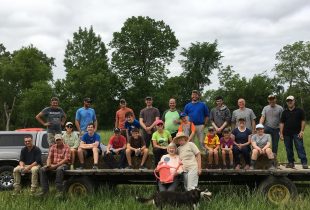Outdoor learning for more Ontario students
There is no better way for students to learn about wetland conservation than by trekking into outdoor classrooms and getting their hands dirty. Thanks to new funding by some long-time partners, more Ontario students will have the opportunity to do just that.

For young people like Samantha Auger, a Timiskaming District Secondary School (TSDD) student, outdoor learning about nature and our critical natural resources first-hand is an amazing opportunity. And being able to share what she’s learned with other students in her community, is something she won’t soon forget.
“I’ve learned so many new things about wetlands and marshes, resource management, and the impact that humans have on the environment” says Auger. “But I’ve also had the amazing opportunity to show younger children things like how to hold birds and search for marine insects, as well as about the importance of wetlands.”
Research shows that getting students active in local projects and providing them with real world models has significant value in changing understanding, attitudes and behaviour. That’s why educating youth about wetlands and waterfowl is a big part of our mission at DUC. We offer a variety of award-winning education programs and work with partners to engage youth and empower them to make a difference in their own communities.
Wetland Centres of Excellence (WCE) are schools like TSDD that commit to the long-term care of local wetlands and where students plan and undertake a variety of conservation and education-related activities. Each WCE is based on the unique nature of the local wetlands and the interests of their students. Their activities range from tackling wetland restoration and habitat improvement projects to research, or like TSDD, providing secondary students the opportunity to deliver mentored wetland field trips to elementary classes in their communities.
“It’s important to teach the next generation about the importance of the land and its natural resources,” says Stephanie Walker, education specialist for DUC. “These centres are great examples of the kinds of engaging and practical hands-on learning that brings education to life. They create a real commitment from young people to be involved in their communities and in conservation activities in general.”
Project Webfoot, DUC’s elementary school program, links specifically to the Grade 4 to 6 curricula in jurisdictions across Canada. It creates the opportunity for students to apply their learning and connect with nature through safe, interactive and inspiring educational content both inside and outside the classroom.
Thanks to recent financial commitments by SC Johnson, TD Friends of the Environment, Community Foundation of Ottawa and the Kitchener Waterloo Community Foundation / Londsale and Roberta Schofield Fund, to the tune of more than $100,000, more kids will be reacquainted with the wonders of nature and the great outdoors this year.
“Project Webfoot provides today’s youth with the knowledge and understanding they need to become good stewards of the environment. SC Johnson Canada is proud to be a supporter of this program.” – SC Johnson.
This support will see more Ontario students monitoring water quality, gathering species inventories and banding birds. They’ll also take on stewardship activities like nest box construction and installation, wetland creation, plantings and annual cleanups. In addition to offering elementary students the opportunity to experience outdoor learning first hand, secondary students gain valuable experience delivering the wetland field trips to the younger students in their community. Some will also take on the challenge of maintaining interpretive trails, designing and installing educational signs and constructing docks and nature centres.
Wetlands are one of the most diverse ecosystems on earth – second only to rain forests. Besides providing habitat for hundreds of wildlife species, they naturally filter and store water, mitigate floods, droughts, storm surges and the effects of climate change. And by giving kids the chance to get outside and be inspired by nature, they help students understand and appreciate the role of conservation and have the chance to be powerful change-makers for the environment.



